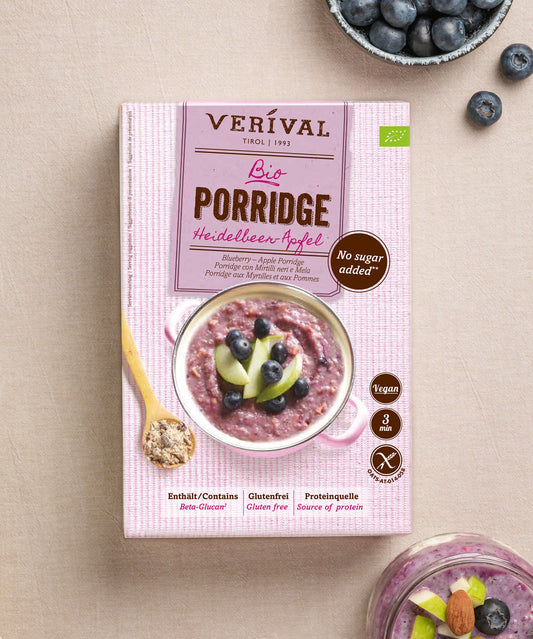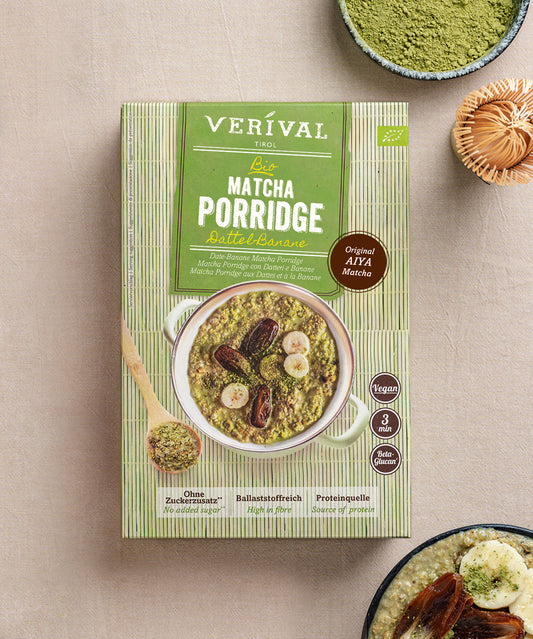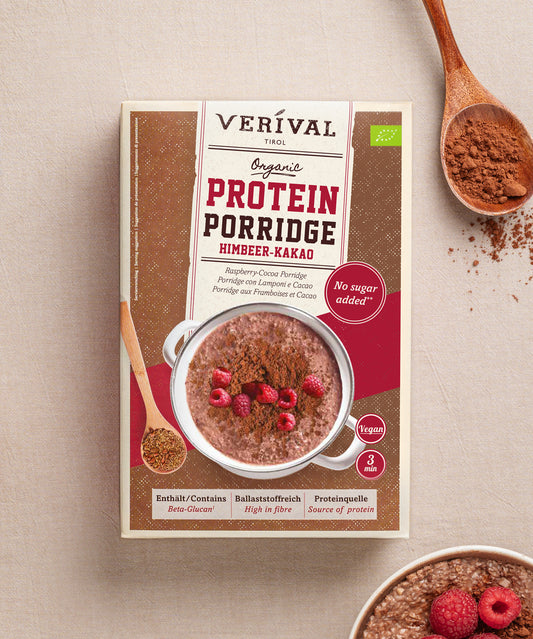Soymilk is one of the most well-known milk alternatives on the market and is particularly appreciated in vegan diets. In this article, we will explore how soymilk is produced, what health benefits it offers and how it differs from other milk alternatives. Learn more about this nutritious and sustainable plant-based drink.
Discover Verival's organic breakfast
What is soymilk?
Soy milk is made from the protein-rich soy bean and is produced in a manufacturing process that requires several steps. First, the beans are soaked, which is essential to soften them and prepare them for further processing. The soft beans are then ground into a fine paste, which forms the starting material for the milk.
This paste is then mixed with water and filtered, separating the solids from the liquid milk. The filtering is crucial to achieve the characteristic smooth and creamy texture of the soy milk. After filtering, the soy milk is boiled to increase the shelf life and improve the flavor by deactivating naturally occurring enzymes that could affect the flavor.
The entire manufacturing process not only affects the safety and quality of the soy milk, but also its slightly nutty and pleasantly mild flavor, which makes it a popular choice in various cuisines.
Soy milk not only has a unique flavor, but is also considered to be particularly healthy. We will explain why soy milk is healthy below.
Nutrient profile and health benefits of soy milk
Before we take a closer look at the ingredients of soy drinks, let's take a look at their basic nutritional values, which make them a valuable addition to any diet. Here is an overview of the typical nutritional values per 100 ml of soy drink, although it should be noted that these values can vary depending on the brand:
| Nutrient | Amount |
| Calories | 54 kcal |
| Protein | 3.3 g |
| Fat | 2.9 g |
| Carbohydrates | 6.3 g |
| Dietary fiber | 0.6 g |
Average nutritional values of soy milk
In addition, soy milk is fortified with vitamins and minerals, which can vary in quantity depending on the manufacturer.
Protein content of soy drinks
Soymilk is particularly valued for its high protein content, making it an excellent choice for vegetarians and vegans. The protein in the plant-based milk is almost as high in quality as animal protein, as it contains all the essential amino acids. This plant-based protein supports muscle building and maintenance and is therefore particularly important in a plant-based diet.
Unsaturated fatty acids
Soymilk is particularly known for its unsaturated fatty acid content, including omega-3 and omega-6 fatty acids. These important fats not only support heart health but are also central to any anti-inflammatory diet. Finally, they help to effectively regulate cholesterol levels, which can lower the risk of heart disease. Their nutritional contribution makes soy milk a valuable choice for anyone who wants to support their heart health naturally.
Vitamins and minerals
Not only is soy milk a great source of protein and healthy fats, but it is also rich in important vitamins and minerals, making it a real powerhouse in your diet. It is often fortified with vitamins such as B2 and B12 and minerals such as calcium. These additives are particularly useful for bone health and support important neurological functions. Calcium plays a central role in strong bones and healthy teeth. Vitamin B12, which is rare in purely plant-based foods, is particularly important for vegans because it is crucial for nerve health and blood formation. This fortification makes soy drinks a valuable addition to any vegan or vegetarian diet.
Isoflavones and their effects
Isoflavones are a key component of soy milk and offer impressive health benefits. They are known for their antioxidant properties and have the potential to reduce the risk of certain cancers. They also have weak estrogen-like activity, making them an important topic in the discussion of hormonal health. In addition, isoflavones help to reduce inflammation in the body and improve skin health, which underscores their important role in a healthy diet.
Make soy milk yourself – it only takes a few steps
Not only does soy milk have many health benefits and is considered healthy, but it is also relatively easy to make yourself. Here is our basic recipe for homemade soy milk:
Soy milk compared to milk and milk alternatives
In a direct comparison with other milk alternatives, soy milk stands out on several important points.
Protein and nutrient content
Soymilk is particularly known for its high protein and overall nutritional content. Compared to almond milk, which typically has lower calories and fat content, soymilk offers a substantially higher protein concentration. This makes it a popular choice for vegans and those looking for a balanced protein intake in their diet.
Calorie and fat content
Almond milk is often the preferred choice for those watching their calories. It contains significantly fewer calories and fat per serving than soy milk. While almond milk typically has only 30 to 50 calories per 100 milliliters, soy milk can have about 54 calories per 100 milliliters, depending on the brand and composition.
Dietary fiber and blood sugar regulation
Oat milk is often valued for its beta-glucan content, which not only aids digestion but can also have a positive effect on blood sugar levels. Although soy milk does not have the same fiber content, it still offers significant health benefits due to its balanced nutrient profile.
Start the day with high-fiber nutrition with Verival
Comparison with cow's milk
Soymilk offers a plant-based alternative to cow's milk that is free from cholesterol and lactose. It is often fortified with calcium and vitamins to match or even exceed the nutritional values of cow's milk, especially in terms of vitamins B12 and D. In addition, plant-based milk made from soy usually contains comparable amounts of protein, making it a good alternative for people with lactose intolerance.
These aspects make soy milk a versatile and healthy option in the range of milk alternatives, offering both nutritional and environmental benefits. It is not only suitable for vegans, but for anyone who wants to make their diet environmentally conscious and health-promoting.
Environmental aspects of soy milk production
The production of soy milk is considered to be more resource-efficient than that of cow's milk, making it a more environmentally friendly choice. One aspect that often arises in environmental discussions is the question of how the cultivation of soybeans affects rainforests.
Criticism of soy milk in terms of environmental damage, especially deforestation, is indeed an important issue. However, a large proportion of the soy grown is not used directly as food, but primarily as animal feed in livestock farming. For example, about 80% of the world's soybean production is used for livestock feed, primarily for cattle, pigs and poultry. This practice contributes significantly to deforestation, particularly in Brazil, one of the world's largest soybean producers. By contrast, the cultivation of soy for direct human consumption, such as soy milk, accounts for a significantly smaller share. Thus, the direct consumption of soy in the form of products such as soy milk accounts for only a small proportion of total soy cultivation. [1]
This information makes it clear that the environmental impact of soy milk is relatively low compared to the use of soy as animal feed. Therefore, soy milk is a more environmentally friendly choice than animal products derived from soy-fed animals.
Breakfast recipes with soy milk
Whether you're making quick overnight oats, a refreshing chia pudding or a classic porridge, these dishes are perfect for an energy-rich start to the day.
Overnight oats with soy milk
Our first recipe is especially for those who are sometimes in a hurry in the morning. You can prepare overnight oats the night before so that you can enjoy them straight away in the morning. You can also refine them with fresh fruit, nuts, nut butter or seeds, as you like.
Chia breakfast with raspberries
As a small breakfast or sweet snack for in between, chia pudding is unbeatable. In our recipe, we combine the superfood with fresh raspberries. If you prefer other fruits, you can easily substitute the berries.
Porridge with soy milk
Do you prefer to decide for yourself what goes into your porridge? With our basic porridge recipe, you can make your breakfast as chocolaty or fruity as you like. The basis is quite simple:
The most important facts at a glance
Finally, we will summarize the most important facts about soy milk:
- Nutritious: Soy milk is full of proteins, essential fats and, when enriched, important vitamins and minerals.
- Heart health: It supports heart health by lowering cholesterol.
- Environmentally friendly: Soymilk takes fewer resources to produce than cow's milk.
- Antioxidant benefits: The isoflavones found in soymilk provide antioxidant benefits that can protect cells.
- Versatile: soy milk can be used flexibly in the kitchen and is a popular alternative in vegan diets.
Healthy breakfast from Verival
Sources
[1] WWF. (2020). Soy. Available at: https://www.worldwildlife.org/industries/soy
Frequently asked questions
How healthy is soy milk?
Soy milk scores points with many health benefits. It is rich in high-quality protein, essential fatty acids, vitamins and minerals. Particularly noteworthy are its isoflavones, which have an antioxidant effect and can support your well-being.
Can you drink soy milk every day?
Yes, soy milk can be consumed daily. It is a good source of protein and other nutrients, but you should make sure you eat a balanced diet to get all the vitamins and minerals you need.
Which is better, soy milk or oat milk?
The choice between soy and oat milk depends on your personal nutritional needs. Soy milk is higher in protein, while oat milk contains more fiber and is often perceived as having a milder flavor.
Is soy milk good for losing weight?
Soy milk can be a helpful addition to a diet, especially because it contains less sugar than many cow's milks and is a good source of protein, which can help with satiety.
Why is soy milk better than regular milk?
For many people, soy milk is a better choice than cow's milk because it contains no lactose, making it suitable for lactose intolerant people. It also has no cholesterol and is a rich source of protein.
























